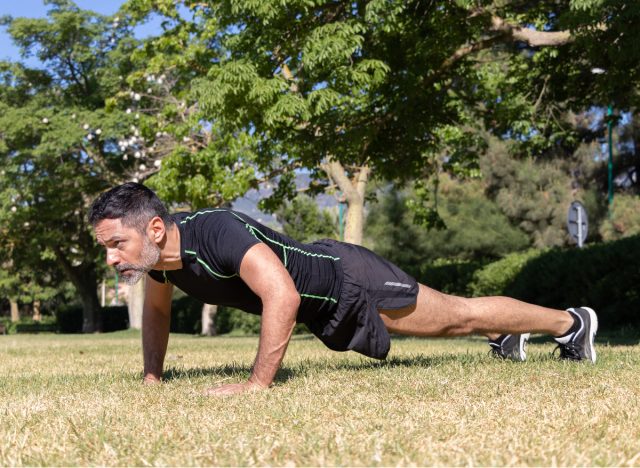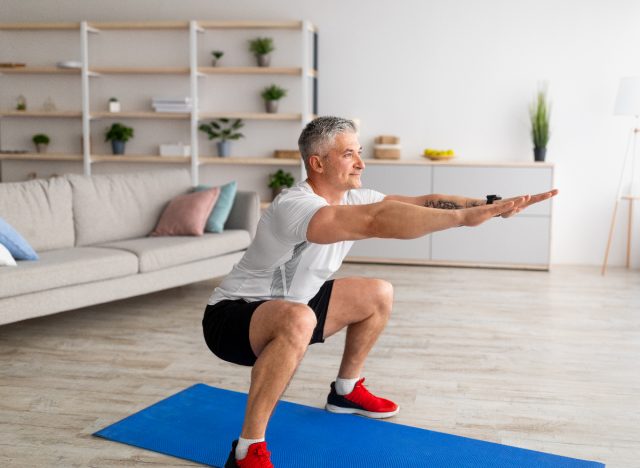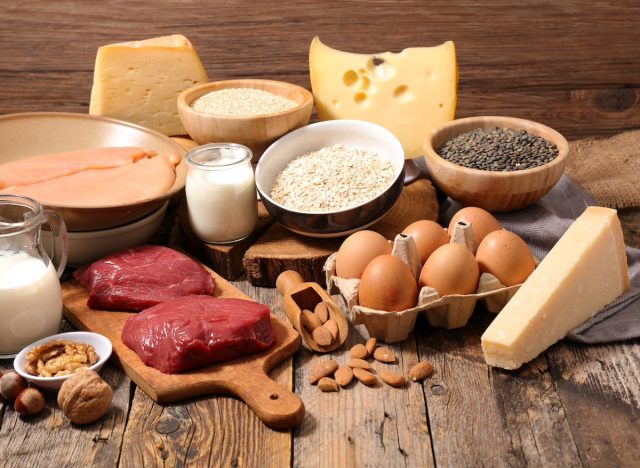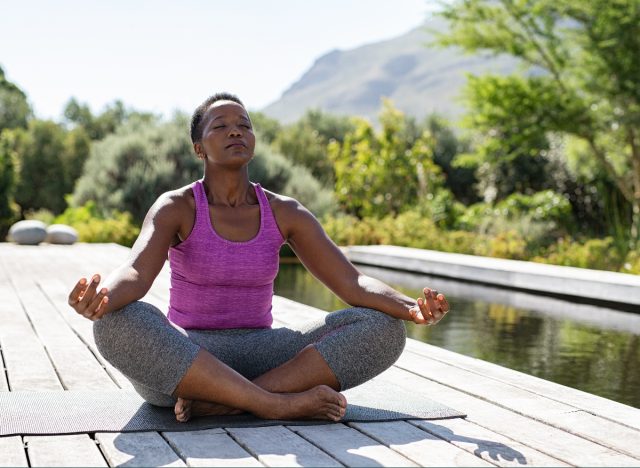8 Tips for Boosting Muscle Growth After 50, According to a Trainer

As you grow into your 30s, 40s, 50s, and beyond, you naturally lose lean muscle mass and function, along with bone density. However, you can turn back your body's clock by engaging in regular physical activity—specifically, weight-bearing exercises (or strength training). There are other healthy habits you can implement into your daily routine as well that will help you gain and maintain muscle. That's why we linked up with Sydney Yeomans, NASM-CPT and director of fitness for BODY20, to pinpoint the best tips to boost muscle growth after 50.
"It is very important to maintain muscle at this age to help support bones and ligaments," explains Yeomans. "We also slowly start to lose muscle mass as we age. Focusing on building muscle will help us to protect bone density and also help us with our balance. It is also important for daily activities such as walking up stairs or basic functional mobility."
Keep reading to learn all about the eight best tips to boost muscle growth after 50. And when you're finished, be sure to check out the 7 Balance Exercises a 60-Year-Old Yoga Instructor Does For Peak Mobility.
Make it a goal to strength train three times a week.

As previously noted, strength training is king if you want to build and preserve lean muscle. Yeomans confirms, "Strength training is going to be the most impactful workout for building muscle growth for those over 50." She suggests being consistent with your efforts and establishing a routine. Aiming to strength train or lift weights three times a week would be ideal.
Focus on low-impact workouts.

"It is important to find a workout that is low-impact," Yeomans stresses. "Resistance training allows those over 50 to build muscle without the wear and tear on the body." You can engage in resistance training by working with dumbbells, resistance bands, kettlebells, etc., and choosing the right weight/resistance that feels best to you.
Prioritize exercises that engage larger muscle groups.

Selecting exercises that activate the larger muscle groups in your body is the name of the game. For instance, Yeomans tells us, "Squats, lunges, and pushups all work larger muscle groups while also assuring to build muscle and support the joints."
Consume enough protein.

Research shows that after exercising, your muscles are left with micro-tears. That's why it's crucial to consume enough protein to aid in the repair process, along with supporting muscle growth. The specific amount of daily protein consumption for muscle growth depends on various factors such as fitness level, age, and weight. However, research suggests consuming 1.6 to 2.2 grams of protein per kilogram of body weight every day to maximize muscle growth.
Give your body plenty of rest between workouts.

You may not feel like you're making much progress on rest and recovery days, but they're a necessary part of the journey. "Without proper rest, the muscles do not have time to repair themselves and increase muscle mass," Yeomans says. "Listen to your body."
Don't rush the process.

You've likely heard the saying before that slow and steady wins the race. "Take your time," Yeomans encourages. "Time under tension is what helps to create tension in your muscle for a longer period of time, which helps create muscle growth. All movements should be completed in a slow and controlled manner and with proper form."
Do stability and balance exercises.

Keeping your body active, flexible, and well-balanced is another major piece of the puzzle. "Incorporate stability and balance exercises to ensure daily functional mobility stays strong," Yeomans says.
According to research, performing balance training exercises can make you feel more confident about your balance and lead to a decreased fear of falling, an increased walking speed, and overall enhanced physical function. Plus, balance exercises boost the strength of your muscles, such as your legs, back, arms, core, and glutes.
Use tech to optimize your workouts.

When in doubt, it's always a smart idea to use a fitness tracker/monitor that can help you keep track of your progress. Yeomans also suggests exploring new modalities such as EMS (Electro Muscular Stimulation).
"EMS is low-impact and [puts] less strain on the joints and ligaments," Yeomans tells us. "In order to build muscle, one would have to utilize heavier weights over time. At BODY20, we artificially mimic your muscle's natural action potential, and we recruit more muscle without having to implement the heavy weight. It's a full-body workout that focuses on compound movements."
- Source: Determinants of muscle and bone aging
- Source: Muscle repair after physiological damage relies on nuclear migration for cellular reconstruction
- Source: Recent Perspectives Regarding the Role of Dietary Protein for the Promotion of Muscle Hypertrophy with Resistance Exercise Training
- Source: Taking balance training for older adults one step further: the rationale for and a description of a proven balance training programme









